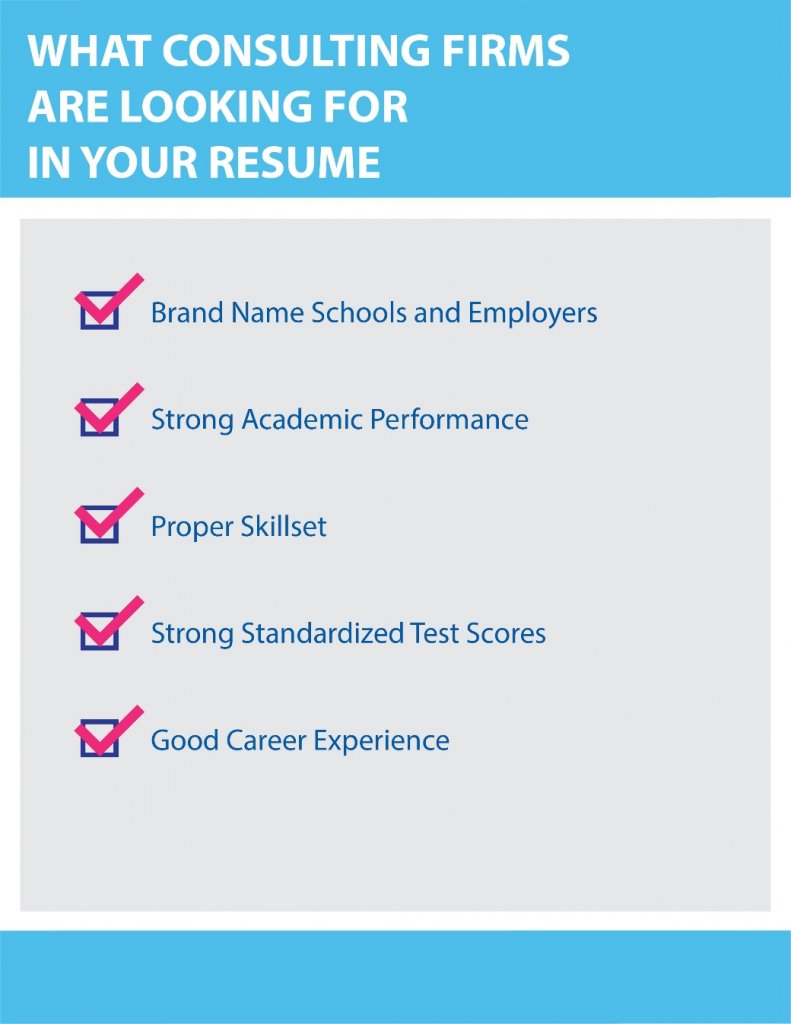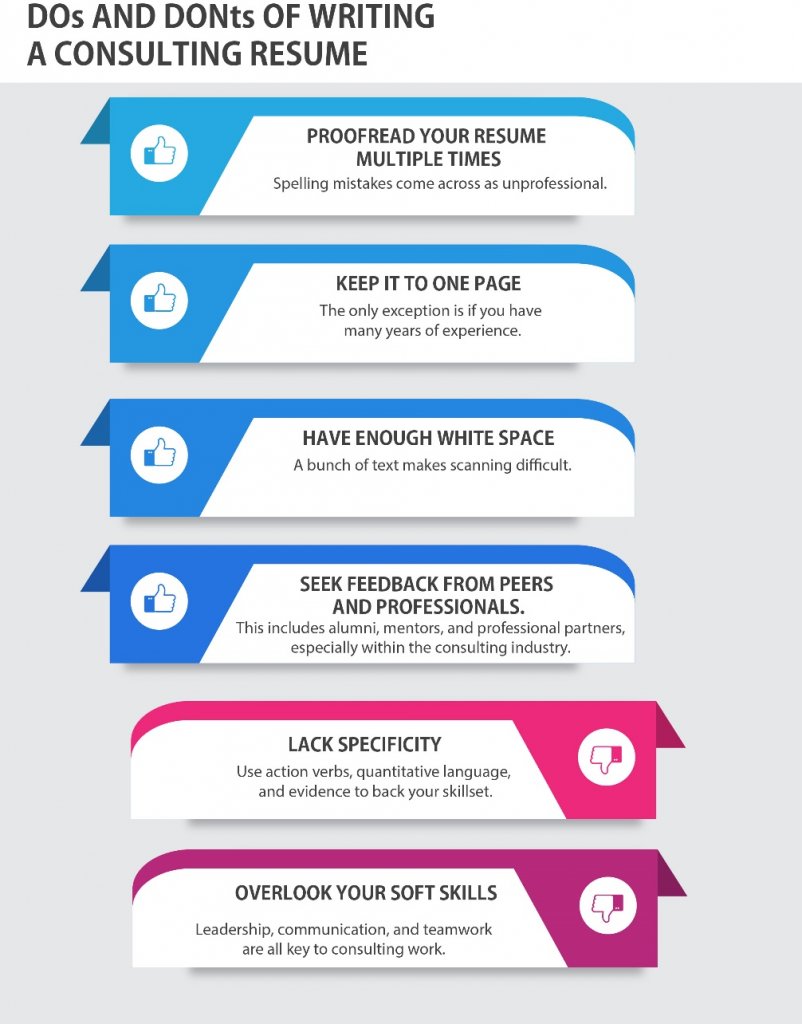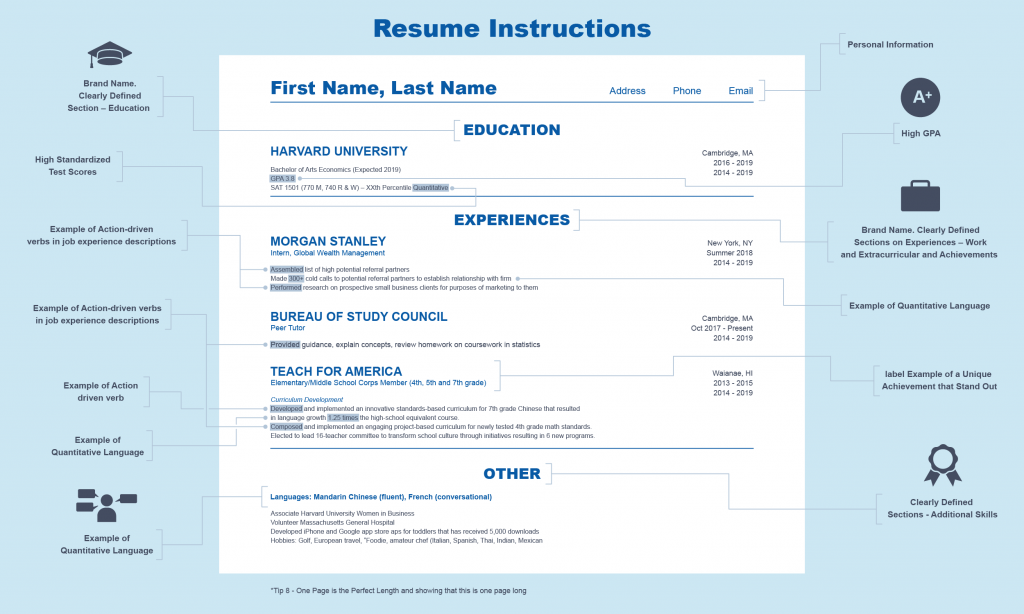For almost any professional job, applicants are required to provide a resume and cover letter to demonstrate their qualifications. Your resume is one of the most important documents during the application process, as it acts as a summary of your education, experience, and skillset.
In the consulting world, your resume is even more important. The top three consulting firms — McKinsey, Bain, and BCG — have acceptance rates of less than five percent during any given year. The resume screening step is where most applicants are eliminated. This goes to show just how important it is to write a strong consulting resume when applying to be a consultant.
FREE Resume Tips Email and Video Series
This form collects your name and email so that we can add you to our email list that delivers the free resources you are requesting. Check out our privacy policy for details on how we protect and manage your submitted data.
We’ll never spam you or share your email. Unsubscribe at any time.
A management consulting resume is different from your standard resume. The difference is not just in terms of format, but content, style, and overall approach. You probably know that the role of a consultant encompasses many different skillsets. A management consultant is a problem-solver, a data expert, and a communications professional, all bundled into one. Because consultants handle complex tasks using many different approaches, firms will be looking at your resume to determine if you have what it takes to be a successful hire. So, what goes into writing the perfect consulting resume? This piece will cover four essential guidelines that you should follow when preparing your resume for a consulting opportunity. By following these steps, you will be in a much better position to impress your employer and secure an interview.
1. Understand What Consulting Firms Are Looking for in Your Resume
In order to write a resume that will get you the interview, you must understand what top consulting firms look for when reviewing candidate applications.

These top firms care less about the proper format than they do about the qualifications and accomplishments that each candidate has. During resume screening, top consulting firms will pay attention to the following components of your resume:
- Brand Name Schools and Employers
The truth is that top consulting firms do care about which schools you attended and which employers you’ve worked for. They have a strong bias for brand name schools and employers that stand out to them and their clients. In fact, it’s the attention that the clients of the firm give to brand name schools that cause the interviewer to pay the same attention to your education background.
It’s not uncommon for a client seeking consulting services to be charged over $500,000 a year. As you would expect, such clients would want to ensure that any consultants working on their project are adequately qualified. Boasting a BS from Yale or an MBA from Harvard certainly adds points, even as a junior consultant working on a major project.
This doesn’t mean that you can’t get a consulting position if you went to a non-target school. However, if you have such brand names on your resume, make it easy for people to see.
- Academic Performance
Consulting firms also pay attention to academic performance. They want to know how you rank in your class and whether you have what it takes to tackle complex consulting projects. Therefore, include your GPA to differentiate your resume from others.
MBA applicants should include their GMAT scores and MBA GPA to be easily seen on their resume.
- Specific Skills Relevant to the Profession
Top consulting firms want to know that you have soft skills, including leadership and communication. While working in the profession, you will need to be able to handle difficult personalities, lead a team, and communicate important information in a manner that people can easily understand. Therefore, make sure you list experiences that demonstrate any leadership and communication experience, among other essential skills.
Activities that demonstrate such skills include job and internship responsibilities, extracurricular activities, and specific experiences that speak to these skills.
- Standardized Test Scores (Especially in Math)
Because grading can vary from one institution to another, top consulting firms would like to see your performance in standardized testing. High performance further strengthens your academic qualifications and shows consulting firms that you have what it takes to be a successful hire. Make sure you include high SATs, GRE, GMAT, MCAT, or LSAT scores in your resume.
- Career Experiences
Consulting firms want to see your career experiences, accompanied by what you achieved during your time in each position. Remember that these firms compare how long your career was with how much you achieved. You may need to show more accomplishments after working for eight years compared to one year.
Regardless of the number of years in a position, follow an achievement-based approach when describing your job. This means emphasizing outcomes, quantifying them, and highlighting parts of your job that apply most specifically to the consulting position in question
2. Properly Format Your Resume
Knowing what top consulting firms expect from your resume, is just the beginning of resume writing. While it does form a solid foundation to build upon, you should also know how to present your academic, professional, and extracurricular skills in a consulting resume.
A lot of this comes down to proper formatting. And by formatting, I don’t mean margins, font size, and columns. Rather, proper formatting refers to presenting your qualifications in a manner that the resume screener can easily identify.
Here are key points to remember when formatting your resume.
- Emphasize Brand Names
Make sure the brand name schools you attended, or big companies that you interned with, are clearly mentioned near the top of your resume. Have them in a bold font right after the name and contact information section.
- Proudly Display a High GPA
Along with brand names, include your high GPA right next to the school and program information. Remember that resume screeners are doing just that: screening your resume. If you make your distinguishing qualifications hard to find, you may be overlooked.
- One Page Does the Trick
This is perhaps the biggest caveat to consulting resume writing. How do you condense so many experiences and qualifications into just one page?
Starting early is key. Take time to reflect on your most relevant experiences, how you’ll allocate bullet points, and how you can play around with margins and line spacing to fit everything on one page. While this may sound challenging, it’s possible — unless you have many years of experience across multiple fields (which you can extend to a second page).
- Have Clearly Defined Sections
A typical consulting resume should be split into five clearly defined sections:
- Personal Information
- Education
- Work Experience
- Extracurricular Experiences and Achievements
- Additional Skills
While you don’t have to follow this format religiously, make sure the information you include covers all sections mentioned above. More importantly, don’t forget about your extracurricular achievements. This section gives you the opportunity to demonstrate important skills such as leadership, teamwork, and entrepreneurship.
- Use Action-Driven Verbs
When your resume is being screened, you have only seconds to attract the attention of your resume screener. So, it is essential that you give some thought to word choice. Start each bullet point with an action verb such as “lead,”“initiated,”“solved,”“saved,” etc. This will attract attention to your specific achievements and make you stand out from other applicants.
- Emphasize Language Skills
If you can speak multiple languages, you may stand out to consulting firms. A firm may view you as an asset for a specific market they’re targeting. Because consultancy is becoming global in today’s world, being fluent in more than one language can set you apart from other applicants.
- Keep It Simple
Remember that not all resume screeners are familiar with your specific field of work. Therefore, avoid industry-specific jargon when describing your accomplishments. Simplify this information in a manner that anyone can easily understand when reading through your resume.
- Demonstrate a Variety of Skills
Avoid falling victim to writing an incomplete resume. How could this happen? If you’ve been working as an engineer for many different companies, don’t include the same job responsibilities repeatedly throughout your resume. Instead, highlight unique experiences that demonstrate your diverse skillset. More importantly, emphasize your achievements rather than your daily responsibilities.
- Use Quantitative Language
The consulting field is driven by data. Numbers, quantities, and other similar information can attract attention to your skillset. As you outline achievements in your professional career, present them using quantified data backed by numbers.
For example, you could state how you developed a quality management system that resulted in lower production costs, from $40 per unit to $30 per unit (or something similar).
3. Stand Out from the Crowd
As you write a consulting resume, remember that you’re looking for any opportunity to stand out from thousands of other applicants. Similarly, resume screeners are looking for what makes you different.
Personal accomplishments such as distinguished scholarships, Olympic medals, or presidential honors can be the accomplishment that sets you apart from another similarly qualified candidate.
If you’ve done smaller, yet unique activities that others haven’t done, also include these in your resume. The goal is to take every opportunity to stand out from the competition.
4. Avoid Making Simple Mistakes
As you finalize your consulting resume, make sure you keep the following Dos and Don’ts in mind. These pointers can help you avoid common, easy-to-prevent mistakes so that you can submit an outstanding resume.
- DO: Proofread your resume multiple times.Spelling mistakes come across as unprofessional.
- DO: Keep it to one page. The only exception is if you have many years of experience.
- DO: Have enough white space.A bunch of text makes scanning difficult.
- DO: Seek feedback from peers and professionals.This includes alumni, mentors, and professional partners, especially within the consulting industry.
- DON’T: Lack specificity.Use action verbs, quantitative language, and evidence to back your skillset.
- DON’T: Overlook your soft skills.Leadership, communication, and teamwork are all key to consulting work.

As you can see from these tips, writing a consulting resume is different from a standard resume for other types of jobs. A consulting resume requires attention to detail, focus on your unique skillset, succinct language, and an achievement-based approach. Writing the perfect consulting resume is not as easy as many people think. It takes lots of time and attention.
Resume Example
Here is an example resume that highlights the tips I’ve mentioned. Reference this example as you create your resume to make sure that you hit all of the important sections. With the exception of your brand name schools/employers and GPA, these items do not need to appear in the order I have them listed. But, make sure that they are all represented in your resume.
Below is an example consulting resume. You can also download the example by clicking here.

More Resources:
FREE Resume Tips Email and Video Series
This form collects your name and email so that we can add you to our email list that delivers the free resources you are requesting. Check out our privacy policy for details on how we protect and manager your submitted data.
We’ll never spam you or share your email. Unsubscribe at any time.




127 thoughts on “Consulting Resume – The Ultimate Guide on How to Write the Perfect Consulting Resume”
Hi Victor,
I am a mech engineer with a Masters from a top 15 school in the US and a bachelors from a top 10 (non-IIT) school in India. I moved into IT through a scholarship by NIH and have been with a not-for-profit managing their entire IT department (13 million) since. I’ve been admitted in SBS (Oxford) for a MBA. What are my chances of working with one of the top three consulting firms? Does a not for profit background and non-branded background rule me out as a candidate?
Thank you
DKP
Hi Victor,
Just wanted to give you some Kudos for that helpful article.
Good work.
Greetings from Germany,
Andre.
Dear Victor,
I am working as a procurement research analyst in a start up company in India. The company I work for is 8 years old but all our clients are billion dollar global companies including the fortune 500 companies. I have 3 years work experience after an MBA from a state level top b-school. I am aiming at the big 4. Do I have a chance? Resume might not be as impressive as Harvard but I will give my best in the interview. My question is am I even in the race?
It’s hard to tell. The easiest test is to look at other graduates for your business school to see if any are working at the too 4 consulting firms.
Victor
Hi Victor,
Should post-college graduates abridge resume to 1 page?
Chang,
In terms of resume length, the rough rule of thumb is one page per decade of post college work experience.
Victor
Hallo Victor,
Helpful and insightful article. You have answered all my questions. I have fired blanks all the time with Consulting companies though I considered myself well suited – Executive management experience more than 15 years management and project management experiences, two masters degree – one cum laude from private college in my home country. Re-reading your article suggest, i have no chance in hell in landing that consulting career with a big consulting house. What a pity.
Hi Victor,
I have an undergrad degree in aeronautical engineering from an overseas university with a 7.00/10.00 GPA, and I’m currently working on my Master’s in Aerospace Engineering at Penn State University. My GPA will only be around 3 when I’m done, however I have 710/800 in Quants and 700/800 in Verbal from my SAT in senior year of high school. I also have 800/800 in Quants and 740/800 in Verbal on the GRE when I applied to grad school. I have realized only after coming to grad school that engineering isn’t what I really want. I have pretty good critical thinking and analytical skills. And I have been told my communication skills are very good too. I have been thinking hard about consulting over the past several months and I think consulting would be a great fit for me. What do you think are my chances of getting a top 10 company to give me an interview shot with the above criteria? What else besides the GRE and SAT scores would I need to offset that bad GPA? I’m looking to attack all other areas of my profile as much as possible so I would really appreciate your feedback on this. Thanks! Thank you for this great site too!
Regards,
Moses
Hi Victor,
Do you have any advice on moving from IT/HR consulting to Strategy consulting? Outside of going back to get an MBA or other advanced degree, I’ve heard the paths are extremely limited.
Best,
Rob
Hey Victor, I have been reading your articles all summer and they are super insightful! Question: Would any of the firms hire someone with a B.A. majoring in Biology and English who is medical school bound? I am going to medical school September 2015, and have a gap year. I ultimately want to work in a place like McKinsey after pursuing an MD and getting some clinical experience. How should I proceed?
Hi Victor! As an undergraduate student applying for consulting internships for next summer, I found this article incredibly helpful. I have one question about the standardized test scores – I have 5’s on both Calculus AP tests and both the language and literature AP tests. These scores are better than my SAT scores in math and critical reasoning – would it be acceptable to use my AP scores on my resume for the standardized test section?
This article was great Victor! The breakdown and examples were especially useful. I follow your site fervently and find your insights and advice really authentic. I have a few questions if you would be able to give me some advice. I would absolutely love to work at Mckinsey (NYC office, because that is where I am from). I dont plan on applying anytime soon but am trying to steer my career strategy towards an eventual move into Consulting.
I am currently working for a fortune 100 engineering company (Deere & Co.) as a Product Engineer and am planning to get a Mba from one of the top 5 schools. My concern is if I do make it to the one of the schools and then apply for a spot at Mckinsey, would my company and Mba school be enough brand naming for me to be considered?
In regards to GPA, my undergraduate GPA was quite low although I still managed to acquire a job at Deere which is consistantly considered a top engineering company. Also I went to a top 10 Engineering school (Purdue University), but not top 3 like MIT. Would these things be detrimental to my future application? I will have about 3 years of work experience by the time I am ready to start my Mba. I was hoping that if I can secure a high GPA at the top Mba school, then I could use that for my GPA on the resume.
Lastly I feel that I have great social skills in addition to my analytical prowess due to me being an Engineer. Although I am quite technical I have a varying array of interests, ranging from quantum physics/mathematics to economics to immigrant identity in the western cultures to cultural/social processes of thought in eastern cultures compared to western and the art of Comedy. Would any of this be relevant to making me stand out as unique?
Im sorry for the obnoxiously long comment lol, but I am hungry for some direction in my endeavor to get back home with the great prestige and opportunity of working for Mckinsey and am trying to get the best strategy to do so. Thanks for all the help so far.
Ridwan,
Short answer: When you have a Harvard MBA, a lot is forgiven or forgotten.
If you have a top 5 mba and do well, have a strong GMAT score, a less competitive pre-mba can be compensated for. Yes, it is noticed — but if the overall trajectory of your resume is strongly upwards, it can be a compensating factor. It might not be enough to get into the top 3 firms, but certainly the rest of the top 10 is a definite possibility.
The GMAT score will be crucial for you. The interpretation you want the reader to have is 1) smart enough to have gone to harvard for undergrad, but for whatever reason the opportunity didn’t exist for this person at that time.
In terms of the low undegrad gpa at a non target school, the interpretation you hope for is the person was smart, but lazy as an undergrad… and for a variety of reasons, got serious and the more recent accomplishments and test scores reflect being smart with the work ethic.
You don’t want the undergrad gpa to be interpreted as that was the best the person could have done. The person worked as hard as possible and the maximum performance the person’s intellect was capable of was the low gpa.
Now if that happens to be true, it will most likely be reflected in a gmat score in a range similar to the undergrad gpa. But if the GMAT score is substantially higher than the undergrad GPA and the mba GPA is excellent, the interpretation (which they will never public admit) is the person was smart but lazy in college. (Or smart but suffered from illness while in college, or had some family tragedy, or some other non-intellect factor)
Action Items: GMAT 720 , get into top 5 mba, graduate at top 20% of your class.
-Victor
This is great! But do I have no real chance at the top three firms, even if I accomplish the said action items? I have become very keen on being able to work at Mckinsey and from many of the stories I have read on your site it seems that people who have not gone to target schools as undergrad were still able to work at the top 3 firms. I was under the impression that if I worked hard enough with all the material and advice you provide and also network well at one of the top 5 Mba programs, that I would have a fighting chance. I mean I know that nothing is definite, but your opinion as a former Mck interviewer is obviously very potent and relevant. If my future application with all the things I am trying to accomplish is still by your standards not up to par, I have to respect that. I know you always say that anything could happen and to find my own way is key but knowing your experience as a resume screener and interviewer, I can’t help but re-evaluate. Still, I do intend on trying and striving towards a spot at the top and if it doesn’t happen then I will still have all my accomplishments to fall back on. Anything you can give me so to bolster my future candidacy would be of immense worth and focus, this is the path I have set out and my determination to go to Mck is absolute. Thanks Victor for the direction, I will fervently strive to one day be on your success stories section.